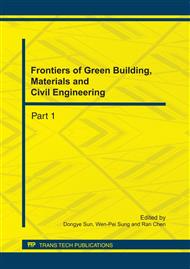p.216
p.220
p.224
p.229
p.242
p.246
p.250
p.257
p.261
Application of Incentive Mechanism in Building Energy Efficiency Regulation
Abstract:
Considering the external characteristics of building energy efficiency, the essay points out the necessity for incentive mechanism design. Building energy regulation should take into account the building owner's participation constraint and incentive compatibility constraint. The asymmetry of information about building energy should be considered, then the game model under asymmetric information can be established. This paper proved that optimal mechanism of non-symmetric information was different from the asymmetric information. According to the analysis of the paper,incentive mechanism is necessary for the government.
Info:
Periodical:
Pages:
242-245
DOI:
Citation:
Online since:
July 2011
Authors:
Price:
Сopyright:
© 2011 Trans Tech Publications Ltd. All Rights Reserved
Share:
Citation:


